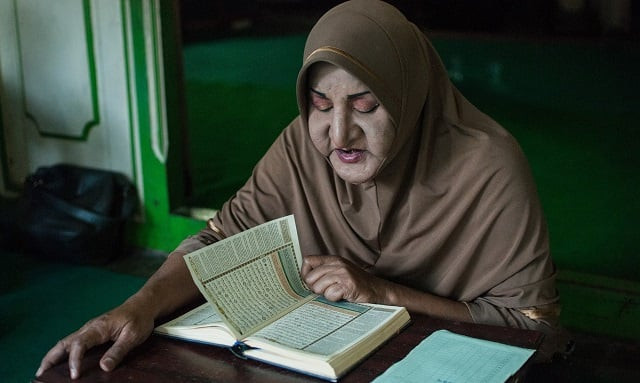Indonesia boasts world's first Islamic boarding school for transgenders
Religious teacher Arif Nuh Safri says, 'if we talk about religion but don’t respect humanity, it’s no use'

Shinta Ratri, founder of the Pondok Pesantren Waria al-Fatah, the world’s only Islamic boarding school for transgender people, in Java, Indonesia.
PHOTO: THE GUARDIAN
The pesantren (boarding school) is the first of it's kind. “In the public mosque we made people uncomfortable. We needed a safe place for trans women to pray,” says Shinta as reported in The Guardian.
The school has quickly become a safe space for the Indonesian transgender community. “In here you can be with a women’s clothes or men’s clothes, it’s up to you,” Shinta says. “It depends how comfortable you are.”
The school is located in a joglo (traditional Javanese wooden house) originally owned by Shinta's grandmother. And unlike most pesantren in Indonesia which cater to students in their teens, the 40 or so members at Shinta's school are older and include four transgender women who live there full time.
Transgender killed by jilted ‘lover’
One of these ladies is Yumi Sara, who has lived at the boarding school since 2010, and works as an HIV/AIDS campaigner in Yogyakarta. “Allah doesn’t care if you are gay or transgender or anything else,” she states. “Transgender is a beautiful creature created by Allah.”
Mario Prajna Pratama, the chairperson of an LGBT rights organisation in Yogyakarta says, “Making a place like this is a statement. It’s like, if you do not want to give us access to pray, we will create our own.”
Transgender individuals are embedded in the cultural history of Java, and are called 'waria' in Indonesian, a combination of the the local words for man and woman. However, they have historically been victims of discrimination, marginalised in society and often forced to take up sex work.
Shinta has worked hard to change society's perspective of transgenders and, in addition to conducting weekly prayers and workshops on the Quran, she also spreads awareness of LGBT issues on university campuses. The increased visibility of LGBT activists such as Shinta has sparked a reaction from more conservative quarters of Indonesian society.
While homosexuality and being transgender are legal in Indonesia, there has been an increase in anti-LGBT sentiment as of late. This has translated into action by the country's authorities.
An example is the raid on a popular sauna frequented by gay men in the Indonesian capital, Jakarta. Being transgender has been identified as a mental disorder by the Indonesian Psychiatric Association and the country's parliament is to vote on a law which will ban LGBT characters from national television shows.
Peshawar forensic dept apologises for refusing to keep transgender's body in morgue
Pratama maintains that anti-LGBT politics have united political and religious conservatives in the Muslim majority country. “To make them unite, they need an issue. What can make them unite? One of the things is the LGBT,” he says.
Local authorities also did not assist Shinta when her school recieved threats of violence in 2016. The Pondok Pesantren Waria al-Fatah closed for four months last year when it was threatened with violence by conservative groups, including a vigilante group called the Front Jihad Islam (FJI).
The leader of the FJI, Abdurrahman claims that the school breaks Islamic regulation. “In the Quran it is said that men should not behave like women,” he says. “It violates sharia.”
However, the local community has been supportive for the most part, including a religious teacher, Arif Nuh Safri, who is based at the Institute of Quranic Studies near Yogyakarta and volunteers his time to teach at the boarding school. “When we talk about religion, we talk about humanity,” he says. “If we talk about religion but don’t respect humanity, it’s no use.”



















COMMENTS
Comments are moderated and generally will be posted if they are on-topic and not abusive.
For more information, please see our Comments FAQ